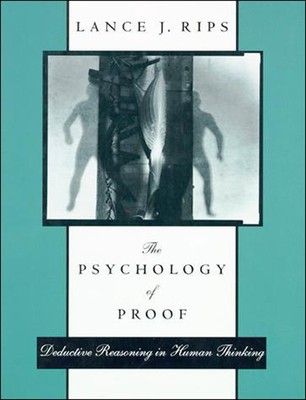
- We will send in 10–14 business days.
- Author: Lance J Rips
- Publisher: MIT Press
- ISBN-10: 0262517213
- ISBN-13: 9780262517218
- Format: 15.8 x 23.1 x 2.4 cm, softcover
- Language: English
- SAVE -10% with code: EXTRA
The Psychology of Proof, Deductive Reasoning in Human Thinking (e-book) (used book) | bookbook.eu
Reviews
Description
Lance Rips describes a unified theory of natural deductive reasoning and fashions a working model of deduction, with strong experimental support, that is capable of playing a central role in mental life.In this provocative book, Lance Rips describes a unified theory of natural deductive reasoning and fashions a working model of deduction, with strong experimental support, that is capable of playing a central role in mental life.
Rips argues that certain inference principles are so central to our notion of intelligence and rationality that they deserve serious psychological investigation to determine their role in individuals' beliefs and conjectures. Asserting that cognitive scientists should consider deductive reasoning as a basis for thinking, Rips develops a theory of natural reasoning abilities and shows how it predicts mental successes and failures in a range of cognitive tasks.
In parts I and II of the book, Rips builds insights from cognitive psychology, logic, and artificial intelligence into a unified theoretical structure. He defends the idea that deduction depends on the ability to construct mental proofs--actual memory units that link given information to conclusions it warrants. From this base Rips develops a computational model of deduction based on two cognitive skills: the ability to make suppositions or assumptions and the ability to posit sub-goals for conclusions. A wide variety of original experiments support this model, including studies of human subjects evaluating logical arguments as well as following and remembering proofs. Unlike previous theories of mental proof, this one handles names and variables in a general way. This capability enables deduction to play a crucial role in other thought processes, such as classifying and problem solving.
In part III, Rips compares the theory to earlier approaches in psychology which confined the study of deduction to a small group of tasks, and examines whether the theory is too rational or too irrational in its mode of thought.
EXTRA 10 % discount with code: EXTRA
The promotion ends in 19d.23:17:20
The discount code is valid when purchasing from 10 €. Discounts do not stack.
- Author: Lance J Rips
- Publisher: MIT Press
- ISBN-10: 0262517213
- ISBN-13: 9780262517218
- Format: 15.8 x 23.1 x 2.4 cm, softcover
- Language: English English
In this provocative book, Lance Rips describes a unified theory of natural deductive reasoning and fashions a working model of deduction, with strong experimental support, that is capable of playing a central role in mental life.
Rips argues that certain inference principles are so central to our notion of intelligence and rationality that they deserve serious psychological investigation to determine their role in individuals' beliefs and conjectures. Asserting that cognitive scientists should consider deductive reasoning as a basis for thinking, Rips develops a theory of natural reasoning abilities and shows how it predicts mental successes and failures in a range of cognitive tasks.
In parts I and II of the book, Rips builds insights from cognitive psychology, logic, and artificial intelligence into a unified theoretical structure. He defends the idea that deduction depends on the ability to construct mental proofs--actual memory units that link given information to conclusions it warrants. From this base Rips develops a computational model of deduction based on two cognitive skills: the ability to make suppositions or assumptions and the ability to posit sub-goals for conclusions. A wide variety of original experiments support this model, including studies of human subjects evaluating logical arguments as well as following and remembering proofs. Unlike previous theories of mental proof, this one handles names and variables in a general way. This capability enables deduction to play a crucial role in other thought processes, such as classifying and problem solving.
In part III, Rips compares the theory to earlier approaches in psychology which confined the study of deduction to a small group of tasks, and examines whether the theory is too rational or too irrational in its mode of thought.


Reviews